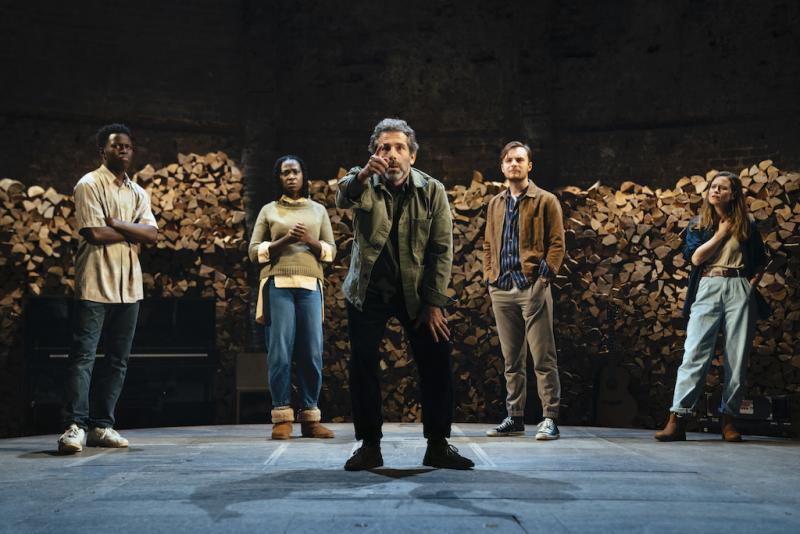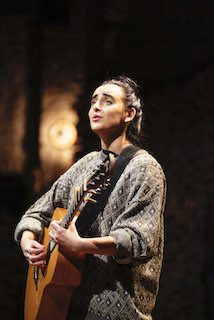Nine Lessons and Carols, Almeida Theatre review – spiky portrayal of a world turned upside down | reviews, news & interviews
Nine Lessons and Carols, Almeida Theatre review – spiky portrayal of a world turned upside down
Nine Lessons and Carols, Almeida Theatre review – spiky portrayal of a world turned upside down
Skilfully interwoven accounts of a life in which togetherness is forbidden

How do you create a secular version of the Nine Lessons and Carols? The original can feel like a formulaic trot through tunes and stories as stale as fossilised mince-pies. Yet it helps to remember that in essence it reflects on the story of a world suddenly turned upside down; a story of refugees, single motherhood, the kindness and cruelty of strangers, and the eternal curveballs that life can throw.
It's completely fitting then that Rebecca Frecknall’s swiftly constructed response to the year of Covid derives its spiky power from the fact that it too portrays a world suddenly turned upside down. In a mark of our times Frecknall and the playwright Chris Bush started to put the script together at the end of October, and days later began to audition the actors over Zoom, compressing a process that would often take months into weeks. The result is a chance to reflect together on the comedies and tragedies of a world in which that headline-grabbing microbe – through its contamination of togetherness – has shattered the essence of what creates both ourselves and our society.
On a bare circular stage, behind which designer Tom Scutt has arranged chopped firewood along the Almeida's walls as a primitive backdrop, seven actors present contrasting accounts of a life lived under lockdown. The C-word is never mentioned, but it is always there: in the socially-distanced exchanges, in the sense of human fragility in the presence of constant uncertainty, in the undertones of grief whether for specific individuals or for a whole way of living.
 That’s not to say that it isn’t often very funny. After a quasi-mythological start, in which humans evolve from living happily alone to feeling the pain of loneliness in the form of a thorn between their shoulder-blades, we fast forward to 2020. One of the most successful early monologues features Katie Brayben as a defiant contrarian revelling in her loneliness: “Burn your bra…burn your birth certificate…burn your neighbours’ houses down…ambush a Deliveroo driver and ride his moped through an Amazon warehouse…Piss down the side of the Shard!”
That’s not to say that it isn’t often very funny. After a quasi-mythological start, in which humans evolve from living happily alone to feeling the pain of loneliness in the form of a thorn between their shoulder-blades, we fast forward to 2020. One of the most successful early monologues features Katie Brayben as a defiant contrarian revelling in her loneliness: “Burn your bra…burn your birth certificate…burn your neighbours’ houses down…ambush a Deliveroo driver and ride his moped through an Amazon warehouse…Piss down the side of the Shard!”
There’s a Caryl Churchill-style ellipsis to the way in which the scenes are executed and interwoven. One moment you’re listening to the revealing and often amusing catalogue of tasks carried out by Toheeb Jimoh’s delivery boy “Dim Sum to Highgate dinner-parties….eco-friendly sex toys to lesbians in Herne Hill… sexts to Jess who thinks I’m a paramedic…she texts me every Thursday to say she’s clapping for me”. Another you’re watching a woman who’s captivated by the trend of people taking off across the world in camper-vans telling her long-term partner that she wants to do the same thing, but without him.
The evening is at its best when it takes a common trope of lockdown and then twists it. The ever-excellent Elliot Levey begins one scene talking us through the challenge of making banana bread. This feels amusing enough, if a little obvious, until you realise that he is talking to his dead partner, so that what seems like gentle comedy suddenly becomes a profound expression of grief. At a different point Luke Thallon talks about rescuing an abandoned dog that proves to be “not great with…people…other dogs…squirrels…sunlight…rain…the dark…” and we all laugh, until he starts to disintegrate, and we perceive that the monologue is about something quite different.
Perhaps inevitably there are some elements to the evening that work better than others. There’s a recurrent brainstorming session for the perfect Christmas ad, which I suspect would work better for audience members who’ve had a couple of glasses of mulled wine. But there is extraordinary power in certain scenes too, not least in the tale of bereavement potently delivered by Naana Agyei-Ampadu that means her own life will never move on from this most modern of plague years.
Director Frecknall’s most resonant success has been with her staging of Summer and Smoke, not least because of its astonishing backdrop of upright pianos with the fronts removed so that their strings resonated and jangled to amplify the emotions of the central character. Here, for the “carols” element, there is simply one upright piano – front intact – and a guitar to accompany the gentle folk-style songs written and partly performed by Maimuna Memon (above).
Singing, of course, has become one of the great threatened activities of this year, and it’s a testament both to Memon’s compositional powers and the chemistry of the cast that when they perform the songs they feel like a simultaneously simple and profound expression of humanity. This, combined with the light that comes beaming through the logs at the end means that you leave the theatre feeling, if not necessarily consoled, marginally more optimistic about the future than you did when you first entered.
rating
Explore topics
Share this article
The future of Arts Journalism
You can stop theartsdesk.com closing!
We urgently need financing to survive. Our fundraising drive has thus far raised £49,000 but we need to reach £100,000 or we will be forced to close. Please contribute here: https://gofund.me/c3f6033d
And if you can forward this information to anyone who might assist, we’d be grateful.

Subscribe to theartsdesk.com
Thank you for continuing to read our work on theartsdesk.com. For unlimited access to every article in its entirety, including our archive of more than 15,000 pieces, we're asking for £5 per month or £40 per year. We feel it's a very good deal, and hope you do too.
To take a subscription now simply click here.
And if you're looking for that extra gift for a friend or family member, why not treat them to a theartsdesk.com gift subscription?
more Theatre
 Ragdoll, Jermyn Street Theatre review - compelling and emotionally truthful
Katherine Moar returns with a Patty Hearst-inspired follow up to her debut hit 'Farm Hall'
Ragdoll, Jermyn Street Theatre review - compelling and emotionally truthful
Katherine Moar returns with a Patty Hearst-inspired follow up to her debut hit 'Farm Hall'
 Troilus and Cressida, Globe Theatre review - a 'problem play' with added problems
Raucous and carnivalesque, but also ugly and incomprehensible
Troilus and Cressida, Globe Theatre review - a 'problem play' with added problems
Raucous and carnivalesque, but also ugly and incomprehensible
 Clarkston, Trafalgar Theatre review - two lads on a road to nowhere
Netflix star, Joe Locke, is the selling point of a production that needs one
Clarkston, Trafalgar Theatre review - two lads on a road to nowhere
Netflix star, Joe Locke, is the selling point of a production that needs one
 Ghost Stories, Peacock Theatre review - spirited staging but short on scares
Impressive spectacle saves an ageing show in an unsuitable venue
Ghost Stories, Peacock Theatre review - spirited staging but short on scares
Impressive spectacle saves an ageing show in an unsuitable venue
 Hamlet, National Theatre review - turning tragedy to comedy is no joke
Hiran Abeyeskera’s childlike prince falls flat in a mixed production
Hamlet, National Theatre review - turning tragedy to comedy is no joke
Hiran Abeyeskera’s childlike prince falls flat in a mixed production
 Rohtko, Barbican review - postmodern meditation on fake and authentic art is less than the sum of its parts
Łukasz Twarkowski's production dazzles without illuminating
Rohtko, Barbican review - postmodern meditation on fake and authentic art is less than the sum of its parts
Łukasz Twarkowski's production dazzles without illuminating
 Lee, Park Theatre review - Lee Krasner looks back on her life as an artist
Informative and interesting, the play's format limits its potential
Lee, Park Theatre review - Lee Krasner looks back on her life as an artist
Informative and interesting, the play's format limits its potential
 Measure for Measure, RSC, Stratford review - 'problem play' has no problem with relevance
Shakespeare, in this adaptation, is at his most perceptive
Measure for Measure, RSC, Stratford review - 'problem play' has no problem with relevance
Shakespeare, in this adaptation, is at his most perceptive
 The Importance of Being Earnest, Noël Coward Theatre review - dazzling and delightful queer fest
West End transfer of National Theatre hit stars Stephen Fry and Olly Alexander
The Importance of Being Earnest, Noël Coward Theatre review - dazzling and delightful queer fest
West End transfer of National Theatre hit stars Stephen Fry and Olly Alexander
 Get Down Tonight, Charing Cross Theatre review - glitz and hits from the 70s
If you love the songs of KC and the Sunshine Band, Please Do Go!
Get Down Tonight, Charing Cross Theatre review - glitz and hits from the 70s
If you love the songs of KC and the Sunshine Band, Please Do Go!
 Punch, Apollo Theatre review - powerful play about the strength of redemption
James Graham's play transfixes the audience at every stage
Punch, Apollo Theatre review - powerful play about the strength of redemption
James Graham's play transfixes the audience at every stage
 The Billionaire Inside Your Head, Hampstead Theatre review - a map of a man with OCD
Will Lord's promising debut burdens a fine cast with too much dialogue
The Billionaire Inside Your Head, Hampstead Theatre review - a map of a man with OCD
Will Lord's promising debut burdens a fine cast with too much dialogue

Add comment